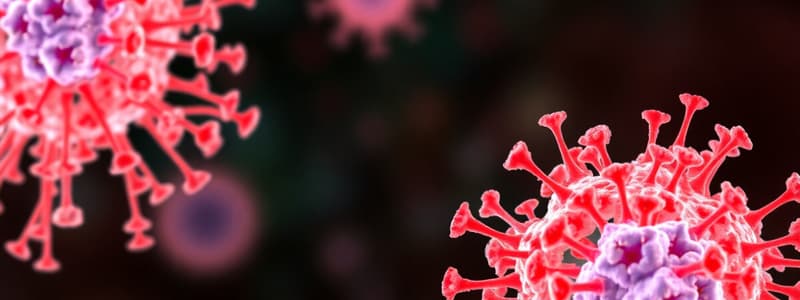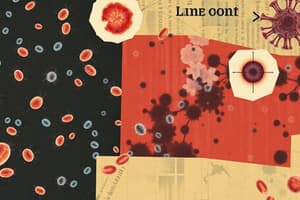Podcast
Questions and Answers
What is the primary consequence of a B cell disorder?
What is the primary consequence of a B cell disorder?
Patients typically experience recurrent infections due to impaired antibody production.
Describe the role of B cells in the humoral immune response.
Describe the role of B cells in the humoral immune response.
B cells are responsible for producing antibodies that neutralize pathogens and mark them for destruction.
What are the different classes of antibodies produced by B cells?
What are the different classes of antibodies produced by B cells?
The main classes of antibodies are IgG, IgA, IgM, IgE, and IgD, each serving distinct functions in immune defense.
Explain the concept of clonal selection in B cell activation.
Explain the concept of clonal selection in B cell activation.
How does immunological memory occur after B cell activation?
How does immunological memory occur after B cell activation?
What are the implications of Selective Immunoglobulin Deficiency?
What are the implications of Selective Immunoglobulin Deficiency?
What is Severe Combined Immune Deficiency (SCID) characterized by?
What is Severe Combined Immune Deficiency (SCID) characterized by?
How do B cell malignancies affect the immune response?
How do B cell malignancies affect the immune response?
What is the primary role of B-cells in humoral immunity?
What is the primary role of B-cells in humoral immunity?
Identify the five main classes of antibodies and their general functions.
Identify the five main classes of antibodies and their general functions.
Explain the concept of clonal selection in relation to B-cell activation.
Explain the concept of clonal selection in relation to B-cell activation.
What is the difference between primary and secondary humoral immune responses?
What is the difference between primary and secondary humoral immune responses?
Describe the role of T-cell help in the activation of B-cells.
Describe the role of T-cell help in the activation of B-cells.
What is the main principle of the clonal selection hypothesis regarding B cells?
What is the main principle of the clonal selection hypothesis regarding B cells?
How do B cells become activated during thymus-dependent activation?
How do B cells become activated during thymus-dependent activation?
What are the two main types of cells that B cells differentiate into after activation?
What are the two main types of cells that B cells differentiate into after activation?
What is the role of antibodies in the humoral immune response?
What is the role of antibodies in the humoral immune response?
How does the secondary antibody response differ from the primary antibody response?
How does the secondary antibody response differ from the primary antibody response?
What factors can influence the duration of immunological memory provided by B cells?
What factors can influence the duration of immunological memory provided by B cells?
Describe the process that occurs when a B cell binds to an antigen via its BCR.
Describe the process that occurs when a B cell binds to an antigen via its BCR.
What is the significance of memory B cells in the immune system?
What is the significance of memory B cells in the immune system?
How does the activation of B cells relate to the overall function of the immune system?
How does the activation of B cells relate to the overall function of the immune system?
What did Sir Frank Macfarlane Burnet contribute to immunology?
What did Sir Frank Macfarlane Burnet contribute to immunology?
Flashcards are hidden until you start studying
Study Notes
Adaptive Immune Response
- The adaptive immune response is a specific response to foreign entities (e.g., bacteria, viruses)
- This response is mediated by B and T lymphocytes
- This response can be generated by vaccination or naturally occurring infections
- This response is responsible for immunological memory, allowing the host to respond rapidly and effectively upon re-exposure to foreign pathogens
- The immune response involves the generation of antibodies, cell-mediated immunity and the development of immunological memory
- The primary antibody response is slower than the secondary antibody response
- The primary antibody response is less specific than the secondary antibody response
Immunological Memory
- Immunological memory involves either B or T cells
- This memory can last the lifetime of an organism
Clonal Selection Hypothesis
- This theory was proposed in 1960 by Sir Frank Macfarlane Burnet
- This hypothesis proposes that each individual contains a large pool of B cells and T cells
- The adaptive immune response is initiated by antigen recognition which stimulates the clonal expansion of a particular B cell or T cell
- The B cell or T cell that recognizes the antigen is stimulated to differentiate into antibody-secreting plasma cells or cytotoxic T cells
- Each T and B cell has a unique receptor
B Cells
- B-cells differentiate into plasma cells, which secrete antibodies
- B-cells can differentiate into memory cells
- B-cells contribute to the humoral arm of the adaptive immune response
- T cells, also known as T-lymphocytes, are responsible for the cell-mediated arm of the adaptive immune response
B Cell Deficiencies
- B-cell defects are often characterized by recurrent infections
- Example: Selective Immunoglobulin Deficiency – IgM deficiency
- IgM deficiency (recurrent respiratory infections)
- B cell disorders include:
- Immunodeficiencies
- Autoimmune diseases
- Hypersensitivity
- Malignancies
Severe Combined Immune Deficiency (SCID)
- Individuals with SCID lack the ability to produce an immune system
- SCID is a severe genetic condition that affects the immune system
- SCID is often called "bubble boy disease"
- SCID is characterized by a lack of functional T and B cells
Other Key Points
- The adaptive immune response requires T cell help and activation
- Vaccination is a method to generate adaptive immunity
Studying That Suits You
Use AI to generate personalized quizzes and flashcards to suit your learning preferences.



